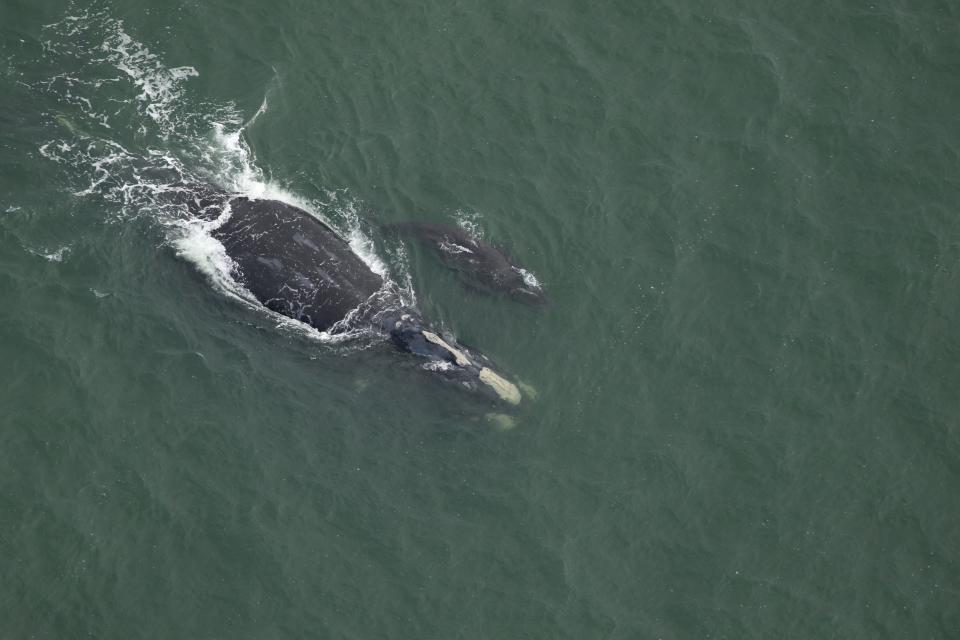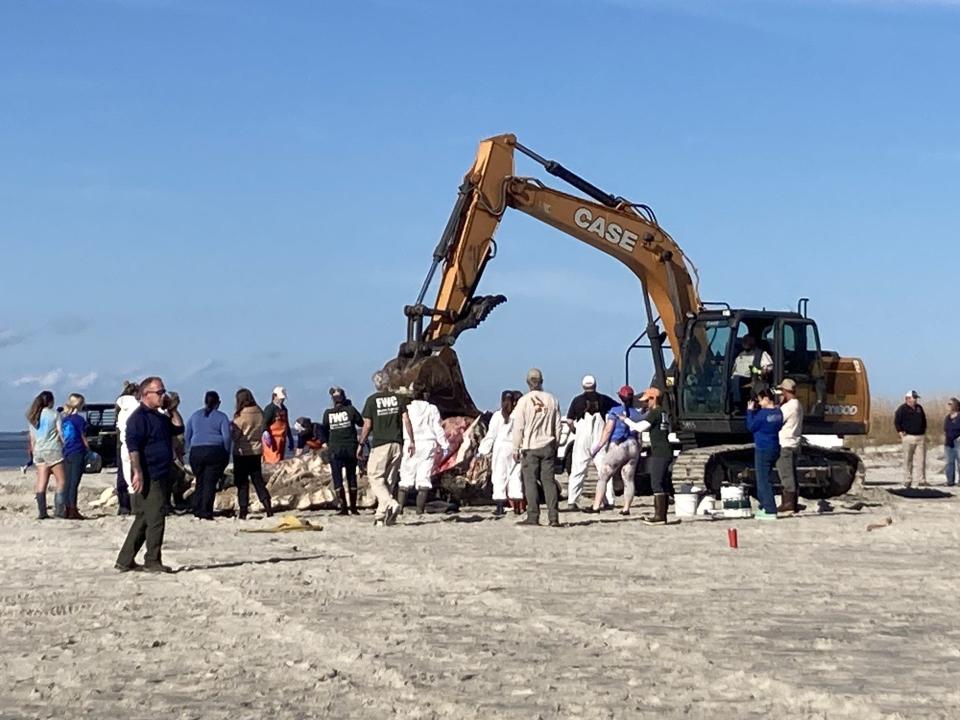First right whale calf spotted this season dies on Georgia coast after vessel strike

Less than a week after Thanksgiving, advocates for the North Atlantic right whale rejoiced at news that the first calf of a new birthing season had been spotted off the coast of South Carolina.
The same supporters are now mourning the death of the same young whale whose carcass, “heavily scavenged by sharks,” was found Sunday stranded on the Cumberland Island National Seashore in Georgia, according to the National Oceanic and Atmospheric Administration Fisheries division.
It was the latest in a series of events underscoring the endangered species’ frailty.
The calf, the eighth documented offspring from a whale known as Juno, was observed Jan. 3 with serious wounds to its head, mouth and lip from a vessel strike.
Responders to Cumberland Island this week identified the dead whale as Juno’s calf based on its “unique injuries and markings” noted in earlier observations, NOAA said.
“Due to the state of the carcass, we will use genetic testing to determine the sex,” the agency added
It is the second reported North Atlantic right whale death in waters off Georgia in less than a month and the third during the current Atlantic calving season. A year-old female right whale was found dead Feb. 13 floating about 20 miles from Tybee Island.
Both deaths in waters off Georgia were attributed to injuries inflicted by collisions with passing vessels.
First Georgia death: Young North Atlantic right whale found dead off Tybee Island

'Most of its short life suffering'
According to NOAA, at least 39 North Atlantic right whale deaths have been confirmed since 2017. That represents more than 10% of the current estimated population, which researchers believe includes fewer than 70 reproducing females.
With the latest death, advocates renewed their push for approval of expanded federal protections for North Atlantic right whales first proposed by NOAA in August 2022.
“Juno’s calf inspired so much hope as the first right whale calf of the season, but it spent most of its short life suffering from terrible propeller wounds as a direct result of the Biden administration’s failure to put such commonsense measures in place,” said Jane Davenport, senior attorney at Defenders of Wildlife.
NOAA offered little clarity Tuesday when asked about the timeline for a decision.
“While NOAA Fisheries anticipated taking action on the proposed rule to modify North Atlantic right whale vessel speed regulations in 2023, the rulemaking process remains underway,” spokesperson Lauren Gaches said.
Meanwhile, the Republican congressman representing the entire 100-mile Georgia coast looks to block attempts by NOAA to enact the proposed changes if they are adopted.
Current federal regulations set a speed limit of 10 knots (11.5 mph) from mid-November to mid-June for vessels at least 65 feet long in a protective zone stretching from Brunswick to Wilmington, North Carolina, an area where right whales gather to give birth in warm Atlantic waters.
NOAA has floated regulations that would apply the same standards to boats 35 feet or longer.
The agency said the latest death likely involved a collision with a smaller vessel. NOAA statistics show that 40% of right whale strikes involve boats in the 35 to 65-foot range.
That does little to sway U.S. Rep. Buddy Carter, who introduced a bill last summer that would prohibit NOAA from spending federal dollars to implement the rule change until its parent agency, the U.S. Department of Commerce, develops and deploys new technology to monitor Atlantic waters for right whales.
When asked about the most-recent right whale death Tuesday, a spokeswoman for Carter referred to one of the congressman’s recent blog posts. In it, Carter, like many critics of the proposed rule changes, argues that the 35-foot standard would endanger “river pilot” boats serving the ports of Savannah and Brunswick.
Tied to knots: Speeding vessels off Georgia coast imperiling whales, report finds

'Conservation efforts cannot pose a threat (to) human lives'
In Savannah, the highly trained pilots steer cargo ships along the potentially precarious 25-mile navigation channel. But to do that, they need to get to and from the vessels when they’re still at sea.
“The speed restriction is unworkably slow and will increase the risk of capsizing,” Carter wrote in the blog. “We must acknowledge that, while protecting the right whale is important, those conservation efforts cannot pose a threat (to) human lives.”
A Georgia Ports Authority executive expressed identical concerns last month, after the whale death near Tybee Island renewed calls to limit the speed of smaller boats.
“NOAA’s proposed rule change would carry with it increased safety risk to vessels and crew during inclement weather – including the possibility cargo ships could be blown off course,” said Jamie McCurry, GPA’s chief administrative officer. “This increased risk would have prudent river pilots delaying vessel transits, leading to ships anchoring offshore for extended periods or skipping calls along much of the East Coast in favor of longer, less efficient and more costly routes.”
However, the proposed new rule includes exceptions aimed at addressing weather-related conditions for vessels smaller than 65 feet, including personal and commercial craft.
Vessels could legally exceed the limits when it is “necessary to maintain safe maneuvering speed and justified because the vessel is in an area where oceanographic, hydrographic, and/or meteorological conditions severely restrict the maneuverability of the vessel and the need to operate at such speed is confirmed by the pilot on board or, when a vessel is not carrying a pilot, the master of the vessel.”
The speed standards also would be waived if the National Weather Service issues a warning that includes potential gale-force winds (at least 39 mph).
“With this improved nuance to the rule that provides for rough weather and other conditions, blanket exemptions and exceptions are not warranted and (would) undermine the intended positive outcomes of the new rule,” explained Gib Brogan, fisheries campaign director at the organization Oceana.
John Deem covers climate change and the environment on the Georgia coast. He can be reached at jdeem@gannett.com
This article originally appeared on Savannah Morning News: Right whale calf dies on Georgia coast after being struck by vessel

